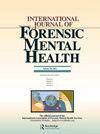Culturally Sensitive Forensic Mental Healthcare for Racialized People Labeled as Not Criminally Responsible: A Scoping Review
IF 0.9
4区 医学
Q3 CRIMINOLOGY & PENOLOGY
International Journal of Forensic Mental Health
Pub Date : 2023-01-19
DOI:10.1080/14999013.2023.2167891
引用次数: 2
Abstract
Abstract Racialized people who are labeled Not Criminally Responsible (NCR) are relatively overrepresented in forensic mental healthcare. In this respect, it is essential to provide culturally sensitive treatment in forensic mental healthcare in an attempt to reduce ethnic disparities. Both general mental healthcare and prison settings are actively exploring and producing empirical knowledge on culturally sensitive treatment, but it remains unclear what evidence is available for forensic mental healthcare delivery. To answer this question, a scoping review is conducted. Three databases (i.e. Medline, Web of Science and APA PsycArticles) were systematically searched for any qualitative, quantitative or theoretical paper about practices or treatment focused on racialized people labeled as NCR in forensic mental healthcare. In total, 551 articles were retrieved. After a detailed selection procedure by two independent researchers, only a small number of eligible articles (<10) were retained. Research on cultural practices in forensic mental healthcare seems to be predominantly based in Western countries and conducted in the last decade. Thematically, the research efforts are targeted toward culturally sensitive assessment tools, therapeutic interventions and programs, and forensic care organization. This study demonstrates how this research field is still in its early stages. There is an undeniable lack of evidence considering culturally sensitive therapeutic frameworks or approaches in forensic mental healthcare. In conclusion, it is imperative that this topic firmly emerges on the research agenda.文化敏感的法医精神保健为种族化的人标记为没有刑事责任:范围审查
被贴上无刑事责任(NCR)标签的种族化人群在法医精神卫生保健中相对较多。在这方面,必须在法医心理保健中提供顾及文化的治疗,以减少种族差异。一般精神保健机构和监狱机构都在积极探索和提供文化敏感治疗方面的经验知识,但目前尚不清楚有哪些证据可用于法医精神保健服务。要回答这个问题,需要进行范围审查。三个数据库(即Medline, Web of Science和APA PsycArticles)被系统地搜索了任何定性的,定量的或理论的关于实践或治疗的论文,这些实践或治疗集中在法医精神保健中被标记为NCR的种族化人群。共检索到551篇文章。经过两位独立研究人员详细的筛选程序,只有少数符合条件的文章(<10)被保留。在法医精神保健文化实践的研究似乎主要基于西方国家,并在过去十年进行。从主题上讲,研究工作的目标是文化敏感的评估工具,治疗干预和计划,以及法医护理组织。这项研究表明,这一研究领域仍处于早期阶段。有一个不可否认的证据缺乏考虑文化敏感的治疗框架或方法在法医精神卫生保健。综上所述,这个话题必须牢牢地出现在研究议程上。
本文章由计算机程序翻译,如有差异,请以英文原文为准。
求助全文
约1分钟内获得全文
求助全文

 求助内容:
求助内容: 应助结果提醒方式:
应助结果提醒方式:


